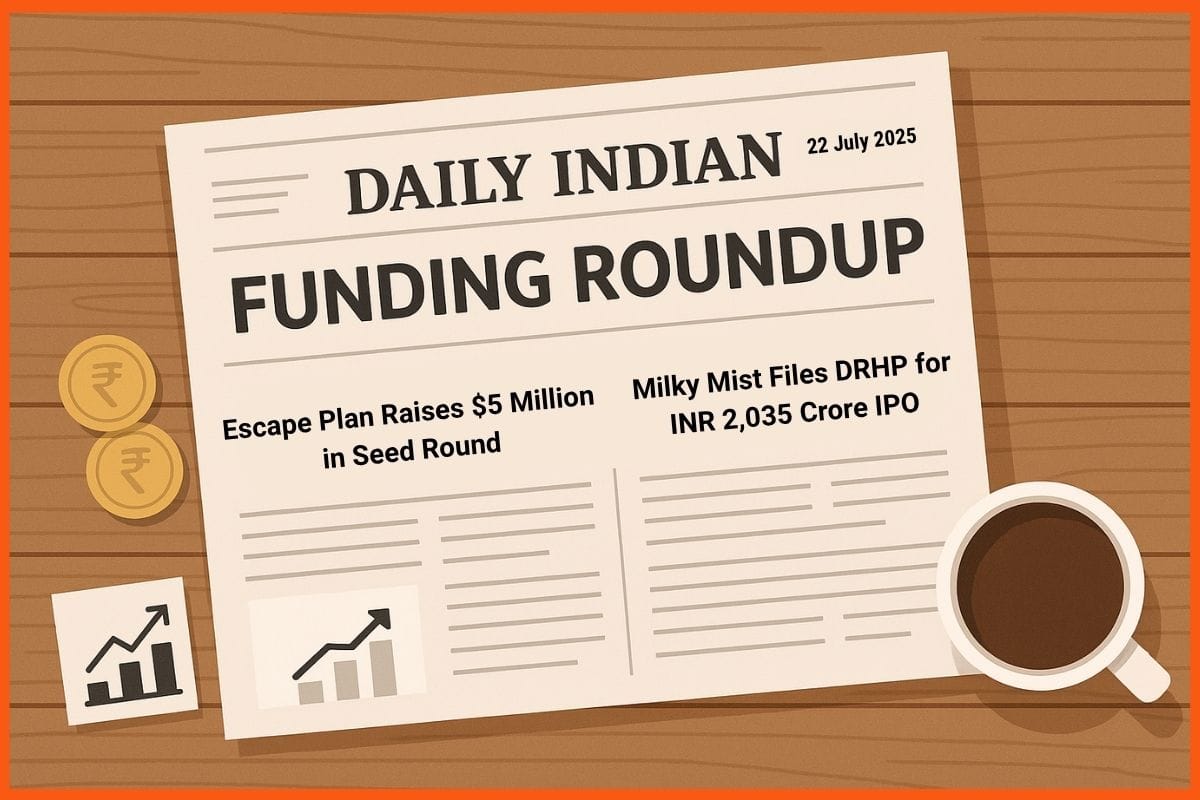Mumbai/Chennai/Thiruvanthapuram, 24th July 2025, Kerala-based Semiconductor startup Netrasemi has raised Rs 107 crore in Series A round from Zoho Corporations Ltd & Unicorn India Ventures. Funds raised will be used for accelerating research and development initiatives, expand manufacturing capabilities, enhance marketing efforts to capture larger domestic and global market share, bring four system-on-chip variants with advanced AI and video analytics features into production and address compute platform requirements of original equipment manufactures (OEMs) for surveillance, industrial robotics, and smart infrastructure products.
The company has successfully completed development of two SoC products currently in the tapeout stage targeting TSMC’s 12nm technology node.
Founded in 2020 by Jyothis Indirabhai, Sreejith Varma and Deepa Geetha, Netrasemi is an Indian Edge AI semiconductor technology company building system-on-chips (SOC) to enable the new-age need for optimal computing for smart IoT products. The company is focused on developing system-on-chips (SoCs) that enable optimal computing for smart IoT products, particularly for addressing complex workloads like video processing. The company’s chips are designed to perform advanced AI-based analytics directly on devices, eliminating the need to send data to servers or the cloud. This capability is powered by Netrasemi’s energy-efficient deep-neural AI acceleration core (NPU) and comprehensive portfolio of in-house silicon intellectual properties.
In the last 12 months, the company has completed development of two Edge-AI chips with advanced video capabilities, initiated development of CCTV AI camera chip for Indian market, established partner agreements for evaluation boards and platform development, signed multiple MOUs with global partners for sample release and product R&D and secured interest and requirements from multiple OEMs for platform development using Netrasemi SoCs.
“Supporting the growth of a strong deep-tech ecosystem in India is a key focus for Zoho, and our investment in Netrasemi reflects that ongoing effort. Developing advanced technological capabilities and expertise within the country can drive long-term progress in critical sectors, ultimately contributing to economic resilience and self-reliance. Our interests with Netrasemi also align on the R&D front especially in areas such as Robotics, AI and Edge processing. Through this investment, we are supporting the development of indigenous IP and innovation, paving the way for globally competitive products to be built in India,” says Shailesh Davey, Co-founder and CEO, Zoho Corporation. Zoho Corporation has been promoting rural development with R&D, by creating opportunities for youth to work in technology sector in villages and Tier 2/3 towns, nurturing and developing the local talent. As part of that effort, it recently opened an R&D centre in Kottarakara, Kerala. The company will be collaborating on R&D projects with Netrasemi at this campus.
Commenting on the investment, Anil Joshi, Managing Partner, Unicorn India Ventures says, “The global edge AI market is evolving at a rapid rate with profound transformations and driving demand for specialized energy efficient semiconductor solutions capable of running AI workloads in real time. We believe Netrasemi has opened up new markets and will be leading the next wave of innovation in the semiconductor industry. The company has witnessed remarkable progress with its smart computing and domain specific AI chips and has been growing significantly. The funding will help the company build advanced Edge AI SoC and also scale its services globally.”
Netrasemi plans to double the current workforce from 83 to 166 chip engineering professionals, target diverse applications across surveillance, industrial robotics, smart home devices, smart city infrastructure and retail sectors. Additionally, the company also plans to increase customer and partner engagement activities along with a focus on next generation chips with superior performance and features. Netrasemi is currently in R&D and prototyping stage of their upcoming launches which is expected in early 2026.
Jyothis Indirabhai, Co-founder & CEO, Netrasemi, says, “In the new age of AI-based automation and next-generation smart devices, domain-specific optimization is no longer a nice-to-have feature—it’s a necessity. Netrasemi’s efficient Domain Specific Architecture (DSA) and optimal intellectual property silicon cores enable both performance and energy efficiency needed for real-time on-device, on-premise computing at the edge. Our chips are designed based on various end-customer application requirements and are both power-efficient and cost-effective. Netrasemi chips enable solution players to develop advanced ML and vision application use cases faster and with ease. We not only make advanced System-on-Chips, but own the IP cores that go inside to make them achieve edge-efficient computing.”
Being backed by Zoho, it will help us leverage their rich market knowledge and would help us enter new industry segments through strong R&D collaboration and joint vision. We highly value Unicorn India Ventures reinvestment and their confidence in our progress and growth potential. The aspiration for a semiconductor-based product economy in India and continuous support from institutions like Ministry of Electronics and Information Technology (MeitY) serves as a true catalyst for Netrasemi’s progress in building future-ready Indian semiconductor chips for the world. We are also thankful for the infrastructure and other support received from institutions like TrEST research park, IIM-K, KSUM, he adds.
In the next 12-18 months Netrasemi aims to complete full mask production of all three SoC families and initiate R&D for next-generation ultra-high performance SoC potentially addressing edge-servers and smart NVR compute requirements.
About Zoho Corporation Ltd:
Zoho Corporation is a privately-held, profitable technology company. Founded in 1996, it is headquartered in Chennai, India. Zoho Corporation has more than 18,000 employees globally. It is the parent company of prominent technology brands including ManageEngine, Zoho, TrainerCentral, Qntrl, and Zakya.
About Unicorn India Ventures:
Started in 2016 by Bhaskar Majumdar and Anil Joshi, Unicorn India Ventures is a technology focused early-stage venture fund that invests in emerging and visionary startups. Unicorn India Ventures launched its first fund with a corpus of Rs 100 crore and invested in 17 companies like SmartCoin, Open Bank, Sequretek, Pharmarack, Genrobotics, Clootrack, FutureCure to mention some. The Fund has emerged as the best performing early-stage fund in India with the stellar exits provided by the fund to its LPs.
Fund II is a Rs 300 Cr fund launched in 2020 that has invested in 20 companies so far like Gamerji, Probus, Daalchini, Windo, HiWi. Most of the portfolio is scaling up fast and has had several uprounds.
Unicorn India Ventures is closing its Rs 1000 Cr Fund III. The first close was reached at Rs 225 crore. The Fund is expected to reach its final close this year. With this Fund, UIV aims to build a portfolio of 20 startups that are focused mostly in the deep tech sector that includes semiconductor, space tech, and medical diagnostics apart from SaaS and India digital platforms. Unicorn has already made 14 investments from this fund and includes companies like Netrasami, Qubehealth, Orbitaid, Aurassure amongst others.
About Netrasemi:
Netrasemi is a semiconductor technology startup focused on developing system-on-chips (SoCs) that enable optimal computing for smart IoT products, particularly for addressing complex workloads like video processing. The company’s chips are designed to perform advanced AI-based analytics directly on devices, eliminating the need to send data to servers or the cloud. This capability is powered by Netrasemi’s energy-efficient deep-neural AI acceleration core (NPU) and comprehensive portfolio of in-house silicon intellectual properties. The company was founded by a team of technologists with significant global experience in designing complex semiconductor chips as part of Intel, Conexant, Hitachi and multiple renowned semiconductor startups.
Netrasemi has received substantial financial and infrastructure support from the Ministry of Electronics and Information Technology (MeitY) under the Design Linked Incentive (DLI) and Chips to Startup (C2S) semiconductor programs.



